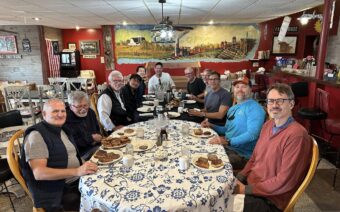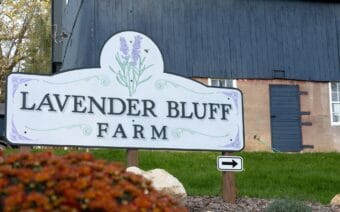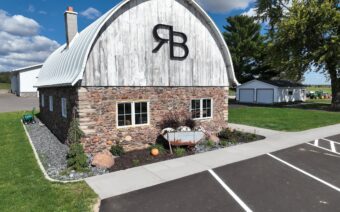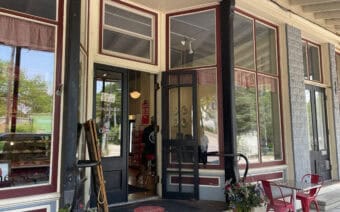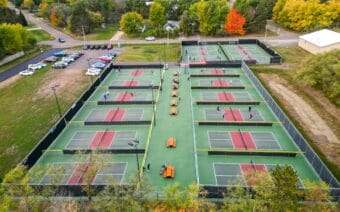
May 27, 2024
BOYCEVILLE – If you would have asked Bifrost Kitchen Owner Meg Wittenmyer as a young child what she wanted to be when she grew up, you likely would not have gotten a single answer.
Now in her 60s, Wittenmyer said she has been able to follow many of her passions – dogs, goats, cheese – and she isn’t done yet.
A winding journey
Wittenmyer said her family made its way to Wisconsin – from Denver, Colorado – in the early 2000s with one goal in mind – to own and operate a dog kennel.
“I wanted to own a dog boarding facility, and I also wanted to live where I was working,” she said.
Wittenmyer said that prompted a search throughout the country for a property that would let her do that.
“We found this place and fell in love with Wisconsin and the country here,” she said. “What we’ve heard about the area, has all turned out to be true. We’ve never regretted our decision to move here.”
Soon after opening the dog kennel – Bifrost Farms Boarding Kennel – which is still operational today, Wittenmyer said a new passion was ignited – goats.
“I found a breed of goat I love – it’s called a mini-Nubian, which is a cross between a Nigerian dwarf and a full-size, standard Nubian,” she said. “I wanted something small enough I could handle by myself but ones that were going to produce good milk.”
As she grew the herd, Wittenmyer said she began making cheese using the milk the goats provided in her home – which in turn, sparked another idea.
“I decided I wanted to be a cheesemaker and have a creamery,” she said.
Wittenmyer said little did she know, Wisconsin is one of the only states that requires a cheesemaker’s license to sell cheese commercially.
“It took about two and a half years, but I got the cheesemaker license (at the University of Wisconsin-Rivers Falls),” she said. “We then converted an old outbuilding, which started out being the goats’ home, but we had built a bigger barn and retrofitted it into a creamery.”
With a herd of about 50 goats, Wittenmyer said, the creamery took off.
“I was selling (goat cheese) all over the place,” she said.
However, when she turned 60 a few years ago, Wittenmyer said she realized it was getting to be too much to handle on her own.
“So, I sold the cheesemaking equipment, but we still had this nice building that was already up to code as a commercial kitchen,” she said.
That is when, Wittenmyer said, her next journey started.

“We decided to get our license and make it an official commercial kitchen,” she said.
And the first to use the kitchen, Wittenmyer said, was her husband, Joel.
“My husband used to be a chef – he’s in IT now – but he is the chef of our family, and he had a few recipes he wanted to make and market,” she said. “So I thought this was a good chance for him to do that.”
Wittenmyer said Joel has been making a variety of things in the kitchen, however, he was only using the space a handful of times during the week – which she said sparked yet another idea.
“Before I had built my own commercial kitchen for the creamery, I looked around the area for a commercial kitchen space and realized there is nothing around this area,” she said. “And after talking with people, I felt like there was a need for it.”
Wittenmyer said her initial thoughts were food trucks – “because they have to have a home base.”
“Then we thought of farmers who wanted to possibly produce a value-added product, but putting in a commercial kitchen made it cost-prohibitive to do so,” she said.
Wittenmyer said when she decided to pull the trigger on the community commercial kitchen concept, she started looking at other areas to see what their prices were – and said, “that’s way too much to charge.”
“We have a low per-hour rate – mostly just to offer to people who don’t have a commercial kitchen,” she said. “Looking for a commercial kitchen to use shouldn’t be that difficult. The area didn’t have anything like it, and we had it, so we wanted to offer it to folks in the community.”
The story behind the name
Wittenmyer said the Bifrost bridge is from Norse mythology – and is supposed to be the bridge from Asgard – where the Norse gods live – down to earth.
“But it’s also known as the bridge of transformation and often depicted as a bridge of rainbow colors – which made sense for us because we are dog lovers,” she said. “We’re also both Norse mythology nuts.”
Kitchen amenities
You name it, Wittenmyer said, the Bifrost Farms Shared Kitchen likely has it.
Aside from the standard equipment – the kitchen offers:
- Two commercial convection ovens
- A Duchess – which can be used to divide dough into up to 32 equal pieces
- A meat slicer
- A 15-quart Hobart mixer
- An Alto Shaam slow-smoker oven
- Kitchen utensils, bowls, pots and pans
- Prep space
“Unless you need some kind of equipment, we probably have everything someone would need,” she said.
The feedback the community commercial kitchen has already been receiving, Wittenmyer said, has been nothing but positive.
“We’ve had bakers in here, pizza makers, I have someone coming out to look at the kitchen for her food truck,” she said. “I also have someone who packages her tea here every week.”
Wittenmyer said some entrepreneurs who are unsure whether they have a sellable product have used the kitchen for R&D.
“Some people have decided, ‘no, that’s not what I want to do,’ but they didn’t have to put in a commercial kitchen themselves to figure that out,” she said. “There are a lot of talented entrepreneurs out there who shouldn’t be hindered by the cost of putting in a commercial kitchen – which can be tens of thousands of dollars to build from the ground up. By providing this space for them to use, they can concentrate on what they are good at.”

The knowledge she and her husband have gained through their ventures with the creamery and now the commercial kitchen, Wittenmyer said, “is certainly free to be shared.”
“I would be happy to talk with somebody about the general process of starting a food business,” she said. “Between the creamery and this commercial kitchen, I have learned a lot.”
In addition to the obvious, Wittenmyer said there are many benefits of using a kitchen commissary.
“It not only provides a cost-effective production space, it is in compliance with regulations and offers a great deal of flexibility,” she said. “If you can only come at night after work, it’s available.”
For the love of dogs
Previously mentioning she originally moved to Wisconsin so she could open a dog boarding facility, Wittenmyer said she has always had a special place in her heart for dogs.
Bifrost Farms Kennel, she said, is located on the other side of their property and offers a variety of services.
Wittenmyer said her love for dogs extends beyond the kennel through her involvement with the Great Dane Rescue of Wisconsin and Minnesota.
“We have a sanctuary in Siren,” she said. “Most rescues don’t have a brick-and-mortar facility – they mostly work with foster homes. But we have a property in Siren that serves as a sanctuary for unadoptable Great Danes.”
Wittenmyer said she serves as the vice president of the board and is active in the rescue community.
“I have three Great Danes of my own, and they are all rescues,” she said.
Always growing
Being able to follow many of her passions over the years, Wittenmyer said she encourages other entrepreneurs – at whatever stage they are at – to keep going.
“What we have found is, it’s probably not going to happen as fast as you want it to,” she said. “But when it’s time, it drops in your lap.”
Wittenmyer said she understands that may sound “kind of woowoo,” but when it’s meant to happen, it does.
Wittenmyer said that doesn’t mean time, effort, hard work, blood, sweat and tears aren’t necessary – and “if there are a ton of obstacles, don’t fight it – wait until it’s your time.”
 Getting modern tools into the hands of today’s learners
Getting modern tools into the hands of today’s learners Suick Lure Company continues to land the lunkers
Suick Lure Company continues to land the lunkers



